President Xi Jinping meets with Czech President Milos Zeman in Beijing, April 28, 2019. [Photo/Xinhua]
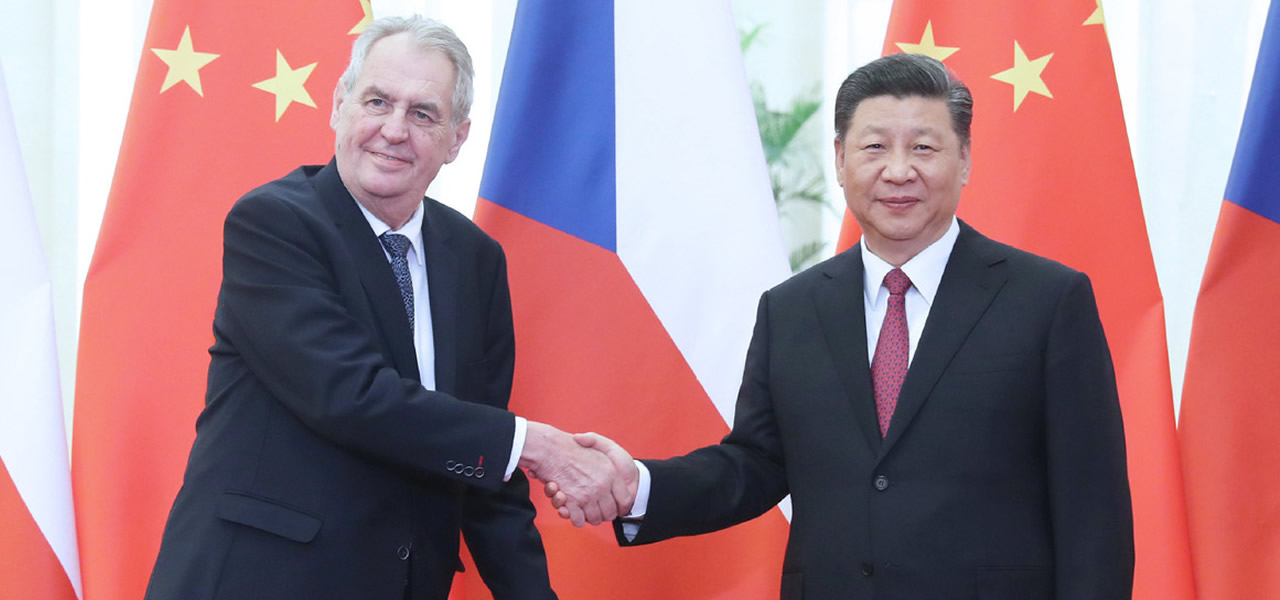

President Xi Jinping meets with Czech President Milos Zeman in Beijing, April 28, 2019. [Photo/Xinhua]
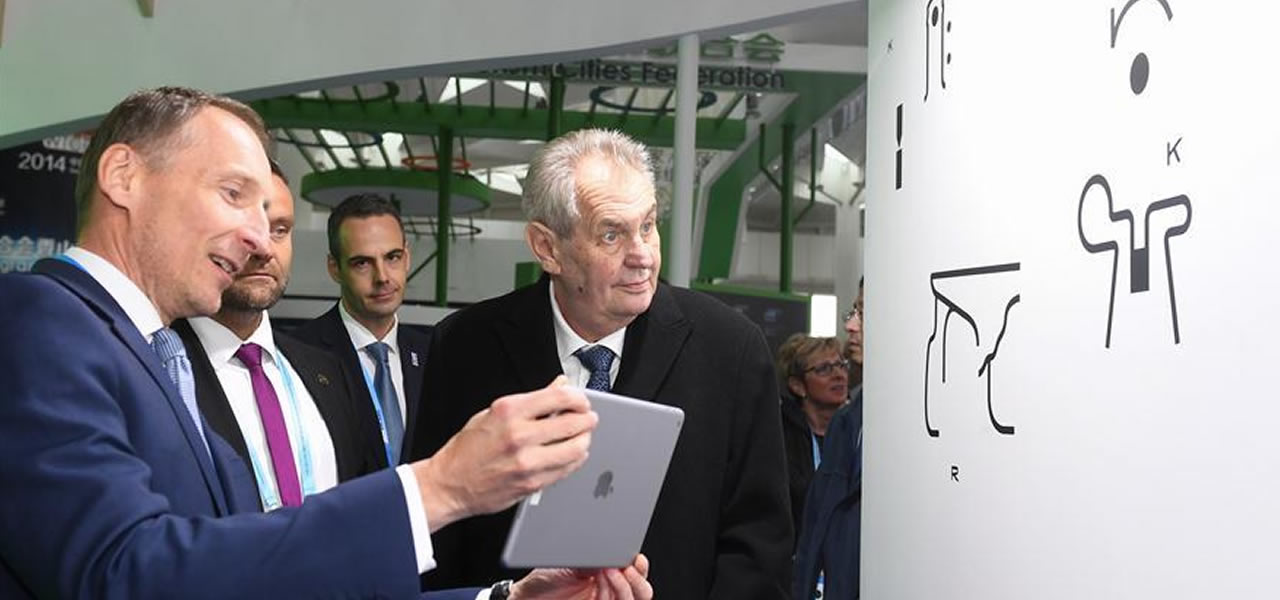
Czech President Milos Zeman visits the Czech Republic booth at the International Pavilion of the International Horticultural Exhibition 2019 Beijing, in Beijing, April 28, 2019. [Photo/Xinhua]

China Esteran Airlines
The European Council announced on Monday that its digital COVID-19 vaccination certificate, which is already in use in 12 countries, had been signed into law, paving the way for quarantine-free travel to return in the region.
The certificate allows for travel restrictions to be lifted across all 27 member states of the European Union, and will be available for specific non-EU countries, too.
With the system going live last month, the EU is ahead of schedule with the program that is officially due to start on July 1.
The European Commission first presented a proposal to create a COVID-19 certificate for free travel within the EU in March, and on May 20, lawmakers reached a provisional agreement. It has now passed its legislative process.
In a Twitter post on Monday, President of the European Commission Ursula von der Leyen said: “With the success of our vaccination campaign and this new EU certificate, we can all look forward to the summer, to traveling safely. And we are bringing back the spirit of an open Europe. Our Union is delivering.”
The commission said the certificate is free of charge, secure and accessible to all. It is available in digital format or on paper, and will be proof that a person has been vaccinated against COVID-19, tested negative, or recovered from an infection.
It highlighted that no-one will be banned from traveling if they have not been vaccinated, as the new certificate will not be a pre-condition to free movement across the bloc.
There is no discrimination against individuals who are not vaccinated, according to the commission.
“Persons who are not vaccinated must be able to continue to exercise their free movement rights, where necessary subject to limitations such as testing or quarantine/self-isolation,” a statement from the commission said.
Countries that have already begun using the digital certificate include Bulgaria, Czech Republic, Denmark, Estonia, Germany, Greece, Croatia, Spain, Lithuania, Latvia, Denmark and Poland.
The European Council had said previously that any nation planning to issue certificates needed to guarantee they would be “fully interoperable, compatible, secure and verifiable”.
Greece, which was one of the tourism-reliant nations firmly behind the original proposals for the certificate, announced over the weekend that it would shorten its nightly curfew as COVID-19 cases eased across the country.
Authorities are also relaxing restrictions on venue capacities and permitting live music at outdoor cafes and restaurants.
Switzerland’s government has said it will relax its rules on wearing face masks outdoors at the end of the month, and people with vaccination certificates will be allowed to visit clubs and discos, while shops, restaurants, and leisure and sports facilities would be allowed to raise capacity limits.
With holidaymakers in Europe now free to make travel plans, Britons are being told to stay at home, which has drawn criticism from the United Kingdom’s travel industry.
The government in the UK has been discouraging overseas vacations this summer, despite the nation’s successful vaccination rollout campaign. It is instead focused on promoting domestic tourism, while restrictions remain.
The British government announced on Monday that its June 21 target date for lifting restrictions would be delayed by four weeks, due to a rise in the number of infections caused by the so-called delta variant.
Flight bookings from countries within the EU to Spain and Greece reached near 50 percent of pre-pandemic levels in June, the Financial Times reported, while the number of UK to EU flights is just 20 percent of levels seen before the crisis.
EasyJet’s chief executive, Johan Lundgren, told the FT relaxation and removal of restrictions has “sparked a positive booking momentum across Europe”, adding: “Europe is demonstrating that a safe reopening of travel is possible and so we continue to urge the UK government to do so urgently.”
Andrew Flintham, managing director of tour operator Tui, told the FT “European countries are watching us with bewilderment”.
He added: “My counterparts in Germany, Belgium and the Netherlands are now seeing travel made possible again, with strong bookings for summer and the pent-up demand for travel we know exists in the UK as well.”
Corruption in Europe has worsened through the pandemic with nearly two-thirds of European Union residents estimated to believe it is a major problem, according to a survey conducted by anti-graft watchdog Transparency International.
Some citizens across the bloc relied on personal connections to access healthcare during the crisis, and governments are believed to have used the pandemic for their own gain, the report found.
The NGO’s report, Global Corruption Barometer-EU 2021, surveyed more than 40,000 people in the EU’s 27 member states between October and December last year, making it one of the largest, most detailed surveys of people’s views and experiences of corruption across the bloc.
It found that 29 percent of respondents had relied on favors or well-connected friends and family to access public sector health services last year, while 6 percent said they had resorted to paying an outright bribe. This is equivalent to more than 106 million people, said the authors of the report in a statement released on Tuesday.
The findings in the report are described as particularly worrying as governments across the EU are rolling out vaccinations to protect those most vulnerable to the virus and are creating plans to allocate billions of euros for post-pandemic recovery.
“Corruption threatens all these activities,” Transparency said, urging EU governments to “redouble their efforts to ensure a fair and equitable recovery from the ongoing pandemic”.
In addition, 62 percent believe that government corruption is a big problem in their country, almost one third think corruption is getting worse, and a further 44 percent think it is not getting any better.
“The EU is often seen as a bastion of integrity, but these findings show that countries across the region remain vulnerable to the insidious effects of corruption,” Delia Ferreira Rubio, chair of Transparency International, said in the statement.
Half of the respondents believe that “bribes or connections are commonly used by businesses to secure profitable government contracts, and that big companies often avoid paying their taxes”, the report said.
The survey also showed an average of 53 percent of people across the EU think their government is controlled by private interests.
This view was strongest in Slovenia, Bulgaria, Cyprus, Croatia and the Czech Republic, but it was a minority opinion in Scandinavian countries.
Michiel van Hulten, director of Transparency International EU, said the results should be a wake-up call for both national governments and EU institutions.
“There are many immediate actions that can be taken to remedy these problems, such as increasing lobbying transparency both at the EU and national levels and tackling tax avoidance,” he said. “And EU policies to protect whistleblowers and fight money laundering must be effectively and swiftly transposed into national law.”
In recent years, we have noticed that the Sustainable Apparel Coalition (SAC) has released the Higg Material Sustainability Index (Higg MSI). However, the one-sidedness and inaccuracy of the index on the environmental impact of silk have created considerable confusion and consternation among the global silk fraternity. This may create cascading effect on the livelihood opportunities to millions of stakeholders in the rural areas and producing mills all across the globe.
With a view to reflect the carbon neutrality and sustainability of silk products in a more comprehensive and objective manner, International Silk Union (ISU) joined hands with several organizations, such as International Sericultural Commission (ISC), Ufficio Italiano Seta (UIS), INTERSOIE France and Brazilian Silk Association (ABRASEDA), to table the following proposal:
Ⅰ. To question the method of developing Higg MSI scoring on silk
Higg MSI arrived the environmental impact value of silk as 1086, which is more than 30 times worse than synthetic fabric. The irrationality of its scoring was mainly manifested on the following aspects:
1. Higg MSI’s assessment of the life cycle of silk only stays at the stage from sericulture to fabric (that is, from “cradle to gate”). Refer to the international standards of ISO 14020:2000 Environmental labels and declarations-General principles and ISO 14040:2006 ISO 14040:2006 Environmental management — Life cycle assessment — Principles and framework, the life cycle assessment of silk products should be a research type from “cradle to grave”, which covers the production, use and disposal of silk ready to wear, silk apparels and silk home textiles. Silk is the “queen of fibers”, and its manufactured goods had a long service life and were eventually biodegradable. Therefore, the research from “cradle to grave” is more convincing, complete and scientific.
2. The evaluation indicators of Higg MSI only included “global warming potential”, “nutrient pollution in water / eutrophication”, “water scarcity”, “fossil fuel depletion” and “chemistry”. It should be added to comprehensively evaluate the environmental performance according to the Product Environmental Footprint Category Rules Guidance (PEFCR).
3. As manifested by relevant data, Higg MSI’s scoring data of silk originated from a paper called Life Cycle Assessment of Indian Silk published by Miguel F. Astudillo et al. on the Journal of Cleaner Production. The data in this paper were collected early than 2013, lack of timeliness, and using the data from individual countries or regions to evaluate the environmental impact of silk is not representative and comprehensive. It is understood that the research was carried out for a completely different purpose, not for the Higg Index.
4. Higg MSI didn’t and still does not make public its calculation method and is free from social supervision. The silk producers made nothing of the results and cannot trace their origins. By and by, the consumers’ negative perception on silk are being intensified and the producers’ confidence also severely blown.
II. To make a comprehensive and objective assessment of life cycle of silk products
In 2015, nearly 200 countries jointly adopted the Paris Agreement at the United Nations Climate Change Conference in Paris. Many countries have enacted low-carbon development strategies in succession. In 2020, China set out the goal of “achieve peak CO2 emissions before 2030 and carbon neutrality before 2060”. Britain boosted the reduction of greenhouse gas using two approaches, restriction and incentive, and identified low-carbon electricity as the core of low-carbon development. By formulating the National Programme for the Mitigation of Climate Change, France clearly defined the selecting and formulating principles of emission reduction measures.
It is a joint duty and commitment of the countries, silk academia, business circles and consumers to respond to the global low-carbon development strategies and facilitate the healthy development of silk industry. The international silk industry requires an open, comprehensive and objective assessment system for the life cycle of silk products, to steer the production and consumption of silk industry.
1. It is necessary and impelling to determine the boundaries of the assessment system which confirms to the current production and consumption of silk according to relevant international standards, as well as evaluate its environmental performance in the whole life cycle from sericulture, production, design, use, re-use, up cycling and disposal of silk products. The evaluated sustainability scores are validated by ISO and provided for public use and interpretation.
2. The evaluation sample should be comprehensive, representative and accurate. It should include major silk producing countries such as China, India and Uzbekistan, as well as silk manufacturers and consumers in Europe and the United States, involving the key links of silk production such as silk reeling, twisting, weaving, printing and dyeing, truly reflect the production technology and production conditions of the international silk industry, and the consumer behavior and consumption habits.
3. It is a compelling duty to divide the industrial chain in a rational way, make a comprehensive, deep and transparent as well as really traceable inventory analysis on each stage and gradually improve the life cycle assessment of silk products, so that a more open and transparent evaluation system that withstands the test of practice can be widely used applied the silk industry, and raise the awareness of environmental responsibility of the silk industry.
4. To actively seek policy support, fully exert the linkage between trade organizations and enterprises, allow high-quality and time-sensitive industrial data to be applied to the assessment system and objectively reflect the environmental performance of silk products. Promote market-oriented green technological innovation, standardize LCA research in the global silk industry, formulate Silk Product Category Rules (PCR), industry standards and sustainability indexes, guiding silk enterprises to green production.
5. Last but not least silk needs all of us to take the initiative to cultivate consumers’ green values and green spending habits, and give full value to the publicity function of the media platform, so that consumers can fully understand carbon neutrality, sustainability and ecological environment protection, and create a demand engine for the development of green silk industry.
Plan energy resources as a whole and advocate greenness and low carbon. We are liable to co-build a green home for silk. Industry organizations, enterprises and brands of International silk should pool efforts, seek common development, propel the comprehensive and objective assessment of the life cycle of silk products, and guarantee the healthy and sustainable development of the silk industry.
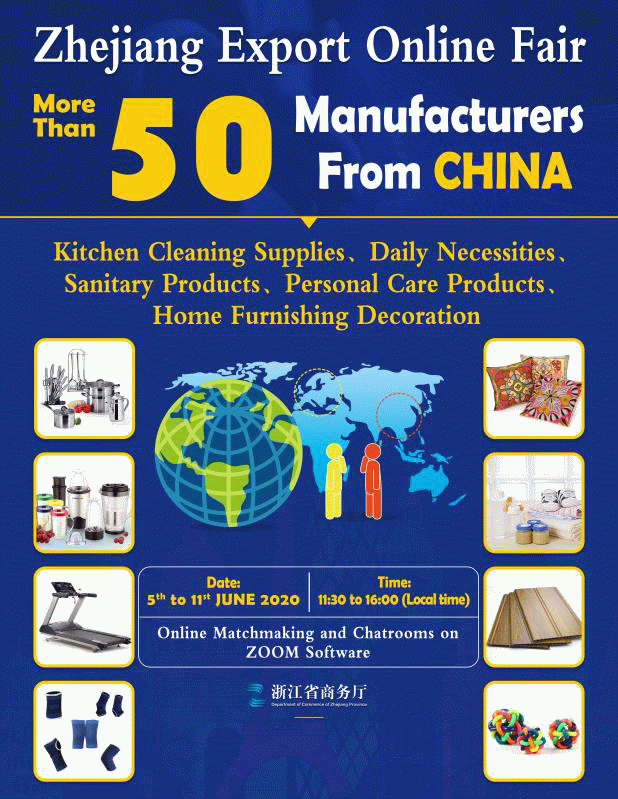
Central and Eastern European countries: Zhejiang Export Online Fair 2020 presents -Household Necessities and Decorative Materials, hosted by the Department of Commerce of Zhejiang Province which will be held from 5th-11st June, 2020. and will be undertaken by Zhejiang Zhongzhe International Exhibition & Commerce CO., Ltd.
Nearly 100 enterprises from Zhejiang and Central and Eastern European countries will be a part of this unique online exhibition through a video conference.
The Covid-19 pandemic has had a massive impact on economies and societies. In an attempt to minimize the impact of lack of production of household daily necessities and decorative supplies, and to provide a solution for enterprises, when they are unable to take part in an on-ground exhibition and merchants are facing hassles in communication, the department of commerce of Zhejiang province is offering this unique online platform wherein an exhibition on Household necessities and decorative materials in Central and Eastern European countries will take place.
The online fair gives a legal, effective, reliable, and affordable way to trade; giving full play to the numbers of Zhejiang economic advantages. Use of big data, mobile internet, social community-integrated digital solutions, such as precision docking. Zhejiang Household necessities and decorative materials product of procurement required with Central and Eastern European countries, keeping clear of the international supply chain.
The Fair will be held from June 5th to 11st 2020, with more than 50 Central and Eastern European countries Household necessities and decorative materials product industry associations, enterprises and related institutions taking part and 50 high-quality Zhejiang Household necessities and decorative materials product manufacturers realizing online accurate docking and accurate matching through internet cloud video conferencing technology.
European families pay attention to adornment, quality, Given the characteristics of the European building materials decoration market, Chinese building materials decoration products and daily necessities suitable for soft decoration are high quality and low price, so the export market in central and eastern Europe has obvious advantages.
During the online fair, digital services such as cloud exhibitions, cloud promotion, and cloud negotiation for the exhibitors will also be provided in Zhejiang province. All aspects and multiple dimensions will be displayed in the exhibits so that the overseas buyers can have a more intuitive understanding of the exhibits and relevant information and promote the online transaction between the supply and demand sides.
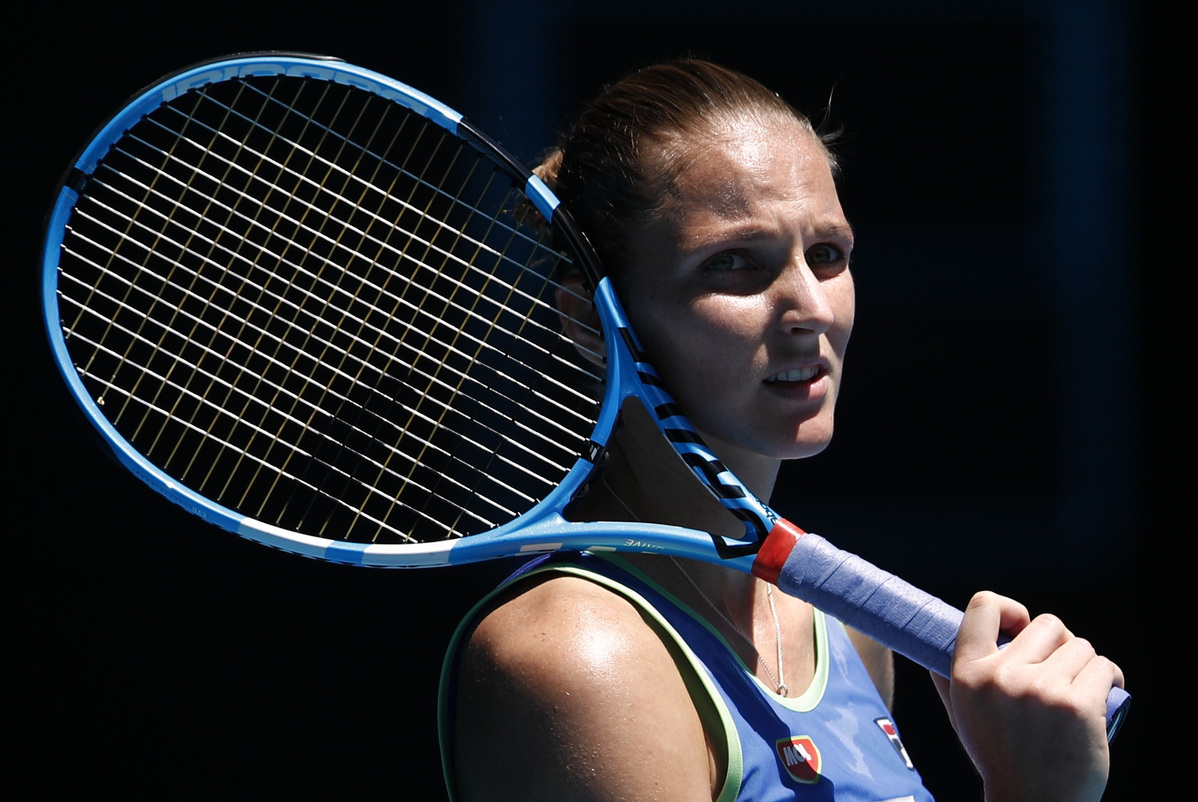
WASHINGTON – Czech tennis star Karolina Pliskova, WTA world number 3, has laughed off her “ice queen” tag in an interview published by WTA on Wednesday, explaining that she gets nervous and scared just like any other player on the circuit.
With 16 career WTA tour titles, the former world number 1 is famous for her calm on-court demeanor as well as her big serving, leaving an impression that she could be immune to pressure in the midst of a match.
“Of course I get nervous, scared, annoyed a lot,” said Pliskova. “It’s not that I don’t want to have emotions, I have so many emotions.”
“People when they see me on TV they are like: ‘Come on, you’re completely frozen.’ Like an ice queen, they call me. Then they see me in real life and I’m laughing all the time and telling jokes, they’re like: ‘No, it’s not you, it’s not possible,'” the 28-year-old noted.
“It’s me, but it’s my focus. It helps me not to panic and to stay calm. It’s not in my personality to tell some jokes on court – I would completely lose my focus and my game would go away completely, so that’s why I’m like this,” she added.
As the Tour is suspended due to the coronavirus pandemic, Pliskova said she will take advantage of the unexpected break by running a coaching camp for kids. “So far, so good. It’s starting to be a little bit too long, but I guess that’s the same for everyone.”
“I’ve had two waves. The first was that I was excited to be at home, I was enjoying being at home, seeing my parents, and I was just doing my stuff at home, organizing my closet, normal things we never have time for. And then I started to get a bit bored and I still tried to practice, to exercise or to play tennis every day for one or two hours.”
“It’s difficult for everyone, but you can find some positives from this situation. I’m seeing my parents like never before and my friends once per week. I’m like OK, this is the best time! I miss tournaments, I miss travelling. Hopefully everything will be better soon.”
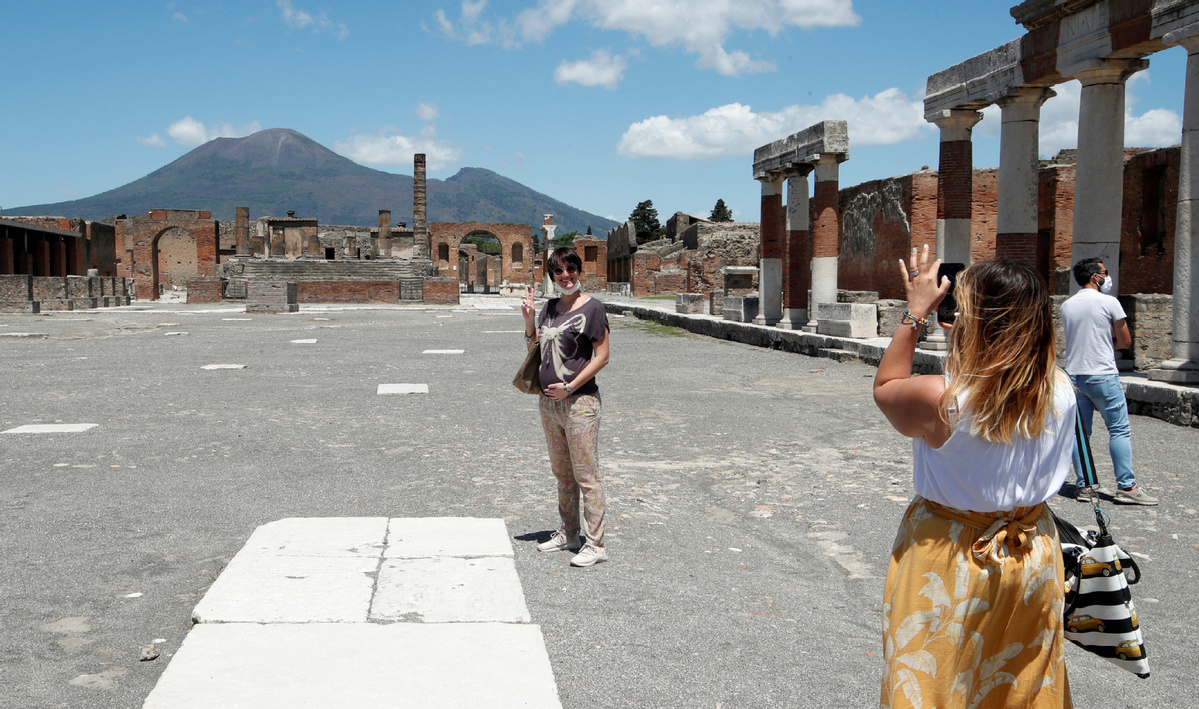
Italy reopened to European travelers on Wednesday, three months after the country went into a coronavirus lockdown, with all hopes pinned on reviving its key tourism industry as the summer season begins.
Gondolas are ready to punt along Venice’s canals, lovers will be able to act out Romeo and Juliet on Verona’s famed balcony, and gladiator fans can pose for selfies at Rome’s Colosseum.
But there were fears that many foreign tourists would be put off from visiting a country still shaking off a vicious pandemic.
“Come to Calabria. There’s only one risk: That you’ll get fat,” Jole Santelli, the southern region’s governor, said on Sunday as the race began to lure big spenders-or any spenders-back to Italy’s sandy shores.
Italy was the first European country to be hit hard by the coronavirus, and has officially reported more than 33,000 deaths.
It imposed an economically-crippling lockdown in early March, and has since seen its contagion numbers drop off dramatically.
With the country facing its deepest recession since World War II, it needs foreigners to return, and quickly.
But it is still reporting dozens of new cases a day, particularly in the northern Lombardy region, and some experts warned that the government may have been hasty in permitting travel between regions and from abroad.
International flights were only expected to resume in three main cities: Milan, Rome and Naples.
Meanwhile, Switzerland has warned its citizens that if they went to Italy they would be subject to “health measures” on their return. The country will open its borders with Germany, France and Austria on June 15, but not with Italy.
Separately, Austria is lifting restrictions in mid-June for travel to Germany, Switzerland, the Czech Republic, Slovakia and Hungary-but again, not Italy, described last week by Austrian health minister as “still a hot spot”.
Other countries, such as Belgium and the United Kingdom, are still advising against, or forbidding, all nonessential travel abroad.
In response to perceived anti-Italian sentiment, Foreign Minister Luigi Di Maio has warned countries not to treat Italy “like a leper”.
Italy’s lockdown has had a particularly devastating effect on the tourism sector, which amounts to nearly 13 percent of the country’s GDP.
Parisians return to cafes
In neighboring France, Parisians returned to the City of Light’s beloved sidewalk cafes as lockdown restrictions eased on Tuesday.
The post-lockdown freedom along Paris’ cobbled streets will be tempered by social distancing rules for the city’s once-densely packed cafe tables. Paris City Hall has authorized outside seating areas only, with indoor seating off-limits until June 22. But the tiny tables will have to be spaced at least 1 meter apart, sharply cutting their numbers.
In Russia, a military official said sanitary and quarantine stations would be set up at airfields to hold barrier checkups for foreign delegations coming to participate in the upcoming Victory Parade.
According to Dmitry Trishkin, head of the Russian defense ministry’s main military medical directorate, all foreign participants and guests will be quarantined for two weeks.
Russia reported 8,536 new cases of the virus on Wednesday, taking its nationwide tally to 432,277, the third highest in the world.
The death toll hit 5,215 after the authorities said they had recorded another 178 deaths from the virus since the previous day.
Agencies and Ren Qi in Moscow contributed to this story.
Czech-China TCM Center Prague was visited by very eminent professionals yesterday. Delegation coming from Shuguang Hospital Shanghai came to visit partner, Endowment Fund for Support of TCM and alternatives in Prague.
During this meeting the both parties promoted TCM. Czech organizers were very honored to welcome the top experts, medical doctors from Shuguang. Mrs MA, leading this delegation, has been visiting TCM Center for the third time. She was very pleasantly surprised to see the development and new activities of Czech partners.
Nearly seventy people listened the lecture of Dr. Med. Guan Xin, PhD, Chief Adviser of fund, and then could everybody use the possibility to consult with famous medical doctors personally. All of them, within Mrs. MA, coul treat in Prague for many years and they would have more and more clients here.
TCM is very known in Czech Republic, but there is not accredited education. Only a little bit more than 500 Czech Medicine Doctors is allowed to treat by TCM officially, mostly acupuncture. So it is very important to promote Chinese Medicine Doctors and professional level of TCM treating. To show and present them it personally, their knowledge and care show here, in Prague. Many Chinese and Czech people used to visit Czech-China TCM Center, and ask contact to Dr. Med. Guan Xin, PhD, former Chief Doctor at University Hospital Hradec Kralove. After finishing inter government project of TCM Clinic there, he moved to this TCM Center in Prague. As a Chief Adviser he has lectures here, seminaries and individual consultation for public.
“Our aim is to present the highest level of TCM. We have met the top doctors in Shanghai, Beijing and other cities from China. Many of them have been visiting our Czech-China TCM Center in Prague. The highest level, it means at first Chinese medicine doctors. We prefer to show Chinese medicine doctors, ways of treating, products in original and authenticity. Czech doctors and practitioners could learn by them, to have lectures and seminaries. We could send a few of them to Chinese hospitals, time to time. Our product is informed client. He know, what about original TCM, who is able to offer the professional care, where he could find it. It is the most important information for Czech client now,” said Jan Hovorka, President and Founder of Endowment Fund for Support of Traditional Chinese Medicine and Alternatives.
For everybody, who is interesting to visit this interesting place, connecting relations between China and Czech Republic, is possible to come Opletalova 19, Praha 1. All information you can find on info@nfptcma.cz or 773007597.
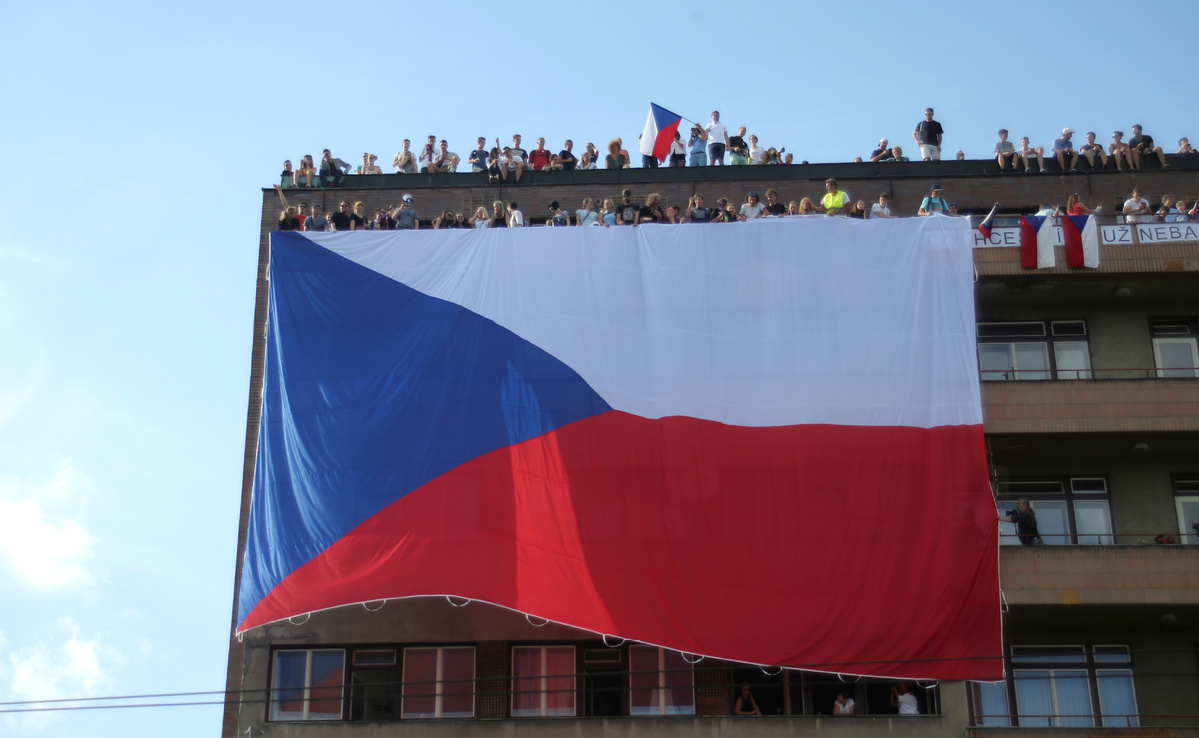
PRAGUE – Hundreds of thousands of people rallied Sunday in Prague, capital of the Czech Republic, demanding resign of the Prime Minister Andrej Babis.
The rally in Letna Park, estimated to be attended by more than 250,000 people, was the culmination of a series of demonstrations in recent weeks against Babis, who has faced investigations over alleged fraud and conflicts of interest.
Waving Czech and also European Union (EU) flags, the crowd chanted “Resign, Resign” and “We’ve had enough”. “No Tolerance for Lies and Fraud,” read a banner unrolled by the demonstrators.
A preliminary EU report released by Czech media in May said that Babis might have had a conflict of interest over EU subsidies involving his former business empire Agrofert. Babis denied wrongdoing and accused the EU of trying to destabilize the Czech Republic.
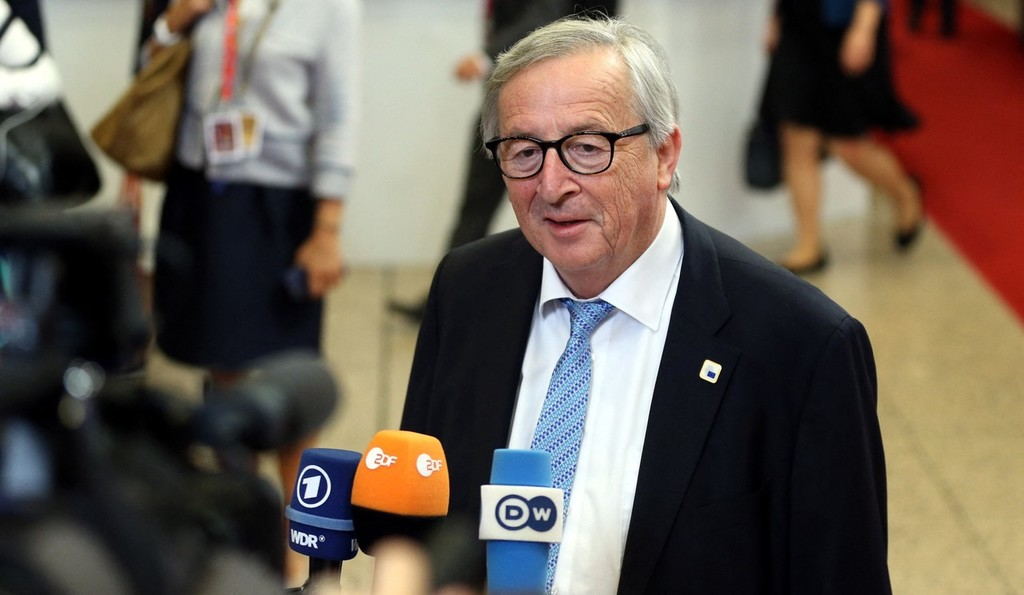
The much-anticipated two-day European Union summit ended on Friday with no progress toward filling the institutions’ top jobs and no consensus on ambitious net-zero greenhouse gas emission target by 2050.
A crisis summit has been scheduled for June 30 in order to fill the posts before the new European Parliament meets in Strasbourg, France, on July 2. Meanwhile, most EU leaders attending the G20 summit in Osaka, Japan, for from June 28 to 29 are expected to hold informal talks on their own issues.
Shada Islam, director of Europe and Geopolitics at Brussels-based Friends of Europe, said she hopes for a quick decision on the EU leadership. “If they keep postponing and are not so decisive, I think we are sending a wrong message to Europeans and to the rest of the world,” she said on Friday.
She said whoever assumes the leadership should be strong and popular enough and able to connect with European citizens who showed the highest turnout in 20 years in the elections for the European Parliament in late May.
“They should be able to work in an efficient manner with world leaders and be strong enough to galvanize worldwide support. We live in a very challenging world, and Europe needs strong and effective leadership,” Islam said.
There have been major disagreements between leaders of the two major member states. German Chancellor Angela Merkel favors the process of lead candidate, known as Spitzenkandidaten in German. She supported Manfred Weber, the lead candidate of the center-right EPP, the largest bloc in the European Parliament, a bloc of which Merkel is a member.
But French President Emmanuel Macron and some other EU leaders oppose Weber to replace Jean-Claude Juncker as president of European Commission.
The fates of other lead candidates, mainly center-left S&D’s lead candidate Frans Timmermans, current first deputy president of the European Commission, and Margrethe Vestager, current European Commissioner for Competition and a lead candidate of Renew Europe, have become less certain.
Vivian Linssen, founding executive director of the International Multidisciplinary Neuroscience Research Center, said even if the leaders will be chosen through the system of Spitzenkandidaten, they have to address the public suspicion and distrust regarding institutions, politicians and bureaucrats.
“The top priority should be to recover lost trust, because without trust, any policy shall fail,” said Lissen, who announced his race as an independent candidate for the presidency of the next European Commission.
Besides a deadlock on EU leadership matters, the summit failed to broker an agreement that would see member states cut carbon emissions dramatically by 2050. Poland, Hungary and Czech Republic refused to sign the text for the net-zero carbon emissions target by 2050.
“I would like to express my regret at this point that a consensus for ensuring a transition to a climate neutral European Union by 2050 was not reached,” said Romanian President Klaus Iohannis. Romania’s six-month presidency at the Council of the European Union will end on June 30.
At the news conference, Tusk also noted that the biggest risks to the global economic outlook are trade and geopolitical tensions.
“We will take this message to the G20 in Osaka, where we will try to persuade our partners to cooperate, rather than threaten one another,” he said.
 Former Czech President Vaclav Klaus, together with Czech Ambassador to China Vladimir Tomsik and Czech Philharmonic General Manager Robert Hanc, visit the Memorial Hall of the Victims of the Nanjing Massacre and pay tribute to the 300,000 victims, Jiangsu province. [Photo provided to chinadaily.com.cn]
Former Czech President Vaclav Klaus, together with Czech Ambassador to China Vladimir Tomsik and Czech Philharmonic General Manager Robert Hanc, visit the Memorial Hall of the Victims of the Nanjing Massacre and pay tribute to the 300,000 victims, Jiangsu province. [Photo provided to chinadaily.com.cn]
For the 70th anniversary of the start of China-Czech diplomatic relations, the Czech Philharmonic, one of the world’s top orchestras, kicked off its 2019 China concert tour in Nanjing on Saturday.
The orchestra held its first performance in China at the Jiangsu Art Center, and many famous performers were included in the roster. The orchestra’s Nanjing program was conducted by renowned Czech conductor Petr Altrichter, who was named Voice of the Czech Republic and My Country respectively over the two nights of the weekend.
As a delightful surprise for the China tour, the orchestra will work with the Jiangsu Symphony Orchestra to play My Country, the Chinese song of the same name composed by Liu Chi.
Former Czech President Vaclav Klaus said, “The Czech Philharmonic can serve as a great ambassador of Czech culture and I am happy it can be presented to Chinese audiences. I am very glad for its cooperation with Nanjing.”
The former president, together with Czech Ambassador to China Vladimir Tomsik and Czech Philharmonic General Manager Robert Hanc, visited the Memorial Hall of the Victims of the Nanjing Massacre and took part in a flower-laying ceremony in memory of the 300,000 victims.
A Nanjing delegation has been invited to visit the Lidice Holocaust Memorial and the site of the Terezin Nazi Concentration Camp in the Czech Republic.
“The Czech Republic and China are both countries that faced similar struggles during World War II,” Tomsik said. “We have strived for peace and peaceful cooperation. Through the universal language of music, different races, nations and countries can connect to build a community with a better and brighter future for mankind.
“I believe endeavors like the Czech Philharmonic’s tour of China can strengthen bonds of friendship between countries and their peoples. We can build a more prosperous future together.”
The Czech Philharmonic Orchestra also signed a memorandum of cooperation with Jiangsu province to form a strategic partnership with the city of Nanjing for the next five years.
According to the memorandum, the two sides will strengthen cooperation in music performances, music festivals, artist exchanges and art education.
Beginning this year, the Czech Philharmonic will send their musicians to China yearly for both educational and performance purposes. Musicians from the Jiangsu Symphony will be invited to participate in cultural exchange projects in Prague.
“We are excited to share Czech history and culture through classical music,” Hanc said.. “Since music is the most beautiful, borderless and universal language, we firmly believe music can become a very important means of communication between the Czech and Chinese people.
“Through music we can further enhance our mutual understanding.”